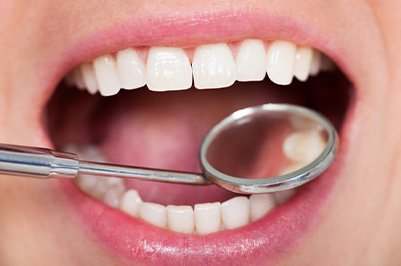Dental Implants – Putnam, CT
Replacement Teeth That Look & Feel Like the Real Thing

Are you missing a tooth? If you are, it’s important to have it replaced because leaving a space in your smile gives room for other teeth along your gums to shift and alter your overall bite. This can lead to many complications, not to mention the impact a gap in your smile will have on your confidence. To help, our team can work with you to replace missing teeth with dental implants in our Putnam, CT dental office!
Why Choose Quiet Corner Dental for Dental Implants?
- Partnered with Local Experts for Dental Implant Surgery
- Low-Interest Dental Financing Available
- Kind Dentists with Decades of Experience
What Are Dental Implants?

A dental implant is a small, metal screw that is placed directly into the socket of the missing tooth. As time goes by, the jaw and the implant will fuse to form a stable foundation for your new dental crown. When enough time has passed, you’ll come to our dental office to complete your dental implant procedure by having a realistic-looking dental crown placed. In the end, your new tooth will be basically indistinguishable from your natural one!
The 4-Step Dental Implant Process

Although each implant case differs from others, you will find that every patient follows this process:
- Initial consultation
- Dental implant surgery
- Osseointegration and abutment placement
- Attaching the final restoration
These steps are essential for the success of your prosthetic teeth, and we can guide you through the process, answer any questions, and help you know what to expect next on your tooth-replacement journey.
Initial Dental Implant Consultation

This first appointment is reserved as a consultation because it gives our dentists the opportunity to examine your mouth, talk about your treatment goals and expectations, and walk you through the process of getting dental implants. If we find anything that could interfere with your dental implants, such as gum disease, we can take care of the issue first, paving the way to successful replacements.
Dental Implant Surgery

To have the implant posts placed in your jaw, we refer you to a trusted specialist in the Putnam area. That way, your treatment is of the highest possible quality. Prior to the surgery, you may need to schedule a consultation with the specialist to go over the details of the procedure, but we can also explain some of it beforehand to give you a clearer idea of what will happen. You should plan on taking at least two days off from work to rest after the procedure.
Dental Implant Osseointegration & Abutment

You should feel “back to normal” within about a week of implant placement, but the real, important healing is just beginning. For the next three to six months, your implants merge with your jawbone in a process known as osseointegration, which gives implants their stability and strength.
Then, small attachments called abutments are secured on top of the posts. These pieces connect the posts to the restorations above the gums.
Delivery of Dental Implant Restoration(s)

Once the abutments are in, we’ll take impressions of your lower and upper arches, design your custom restorations, and send the order to our dental lab. Finally, we can complete your smile by placing your personalized dental crown, bridge, or denture onto your abutments. At that point, you’re free to enjoy your prosthetic teeth! Keep in mind that it could take a little bit of time to adjust to having your full smile back, but with patience and time, you’ll find that this entire process is well worthwhile.
Benefits of Dental Implants

Did you know that every year, an estimated 5 million dental implants are placed worldwide? This unique method for replacing missing teeth continues to gain popularity due to its many benefits. This type of restoration is the only one that is surgically inserted into your jawbone which means it has advantages over the alternatives like dentures or dental bridges. Continue reading below to learn more about how dental implants can help you, and feel free to contact us if you have additional questions.
Day-to-Day Benefits

Tooth loss can impact your daily quality of life because they are essential for performing basic tasks like eating and speaking. Fortunately, dental implants can improve your world in several ways, such as:
- Allowing you to enjoy meals. These artificial teeth are sturdy, standalone structures that don’t come with many dietary restrictions so you can eat a well-balanced diet that includes your favorite foods.
- Restoring your ability to enunciate. Certain sounds and words are formed by pressing your tongue to your teeth in a specific way and with dental implants, you can speak clearly again so that you’re more easily understood.
- Enhancing your appearance. The dental crown that caps your implant can be color-matched to your smile so that it looks, feels, and functions like a natural tooth. You’ll feel much more confident when you’re not so worried about how your smile will be perceived by others.
Health Benefits

Although it may be less immediately obvious than the day-to-day advantages, dental implants also preserve your oral health by:
- Maintaining your jawbone. When pearly whites go missing, your body reabsorbs bone mass from your jaw that’s no longer needed to support them. Your restoration stimulates the bone whenever you bite or chew so that it remains active and healthy to prevent additional tooth loss.
- Supporting surrounding teeth. Your remaining teeth are likely to shift out of alignment to try to fill in any gaps which can wear them down prematurely, leaving them more prone to chips, cracks, and breaks. Your restoration fills the space to keep everything in its place.
- Simple maintenance. Caring for your dental implants is as simple as continuing to brush and floss your teeth twice daily and visiting your dentist every 6 months. This consistently removes harmful bacteria and plaque buildup that contribute to cavities and gum disease to keep your mouth in good condition.
Long-Term Benefits

Your dental implants can continue to serve you in the long run because they are:
- They can last 30+ years if maintained properly, which in some cases is the remainder of your natural life.
- This method of replacing your teeth has a 95% success rate even 10 years after being placed, so you don’t have to be overly worried about developing problems or complications.
- Cost effective. Although you may spend more upfront for this restoration than the alternatives, you could end up saving money down the road because you’re less likely to need to repair or replace them periodically.
Who Dental Implants Can Help

Unlike other tooth-replacement solutions, dental implants replace both the root and crown of the tooth. They can also help patients who are missing one, a few, or an entire arch of teeth. As a result, most generally healthy adults who need to bring back lost teeth are eligible. With that being said, the only way to definitively know whether you’re a good dental implant candidate is to attend a consultation with one of our dentists.
Who Is a Good Candidate for Dental Implants?

During your consultation with our dental implant dentist in Putnam, they will determine:
- If your jawbone is strong enough to support dental implants
- If your gums and any remaining teeth you have are healthy
- If you are committed to healthy habits, like flossing daily
- If you are willing to break bad habits, like smoking
Then, they can determine if this cutting-edge tooth-replacement solution is the best one for you. If it is, then we will begin working on your custom treatment plan.
Missing One Tooth

If you are missing one tooth, whether it’s a front one or a back molar, we can replace it with a single dental implant. This requires us to insert the implant into your jawbone. Once the two have fused together, we will place a lifelike dental crown on top, effectively restoring the visible portion of your tooth as well. One of the biggest perks of this tooth-replacement solution is that, unlike traditional dental bridges, it fills the gap without compromising the structure of your remaining teeth.
Missing Multiple Teeth

Are you missing several teeth consecutively? If so, dental implants are still an option! If we decide together that it’s the best one for you, then we can place a custom dental bridge on top of two implants – one placed at each end of the space. That way, you don’t necessarily need a dedicated implant for each tooth. Not to mention, implant bridges are sturdier than regular ones and don’t require the removal of healthy enamel!
Missing All Teeth

Even if you’ve lost a whole row of teeth, dental implants can bring all of them back. In most cases, all it takes is four to eight posts that are placed at specific points along the arch to support a full denture. With implant dentures, you’ll never have to worry about embarrassing slippage. Plus, with proper care and maintenance, they can last for well over a decade and, since they are custom-made, yours will look and feel extremely natural.
Understanding the Cost of Dental Implants

Now that you know more about getting dental implants in Putnam and who they can help, you’re probably wondering how much they cost. Typically, these replacement teeth are pricier than alternatives like dentures or dental bridges, and with good reason. They’re the only restorations that are surgically inserted into your jawbone for added strength and stability, so they also come with additional fees. However, they can last you a lifetime, making them a cost-effective long-term investment.
Continue reading below to learn more about the factors that impact how much you’ll owe for your dental implants so that you can make an informed decision. Feel free to contact us for more information or to schedule your consultation.
Preliminary Treatments & Dental Implant Surgery

Before you can proceed with dental implants, you must have a consultation appointment to verify that you’re a good candidate for this treatment. Certain preexisting conditions like gum disease and insufficient jawbone density can keep you from moving forward and will need to be addressed first. Any additional work will be included in the final amount due.
Once our team has ensured that your oral health is in good condition, we can schedule your surgery. We want you to get the best possible results, so we partner with the best local experts to place your prosthetic. They can let you know in more detail what this component will cost.
The Parts of Your Dental Implant

Some additional factors that can impact the price of your dental implants include:
- How many are required. Some people only need one or two replacement teeth, whereas others require 4 to 6 or more, which is more expensive.
- The type of restoration. Dental implants can anchor a dental crown, bridge, or dentures, which all have different pricing structures.
- What they’re made of. Usually, the support rod inserted into your jawbone is made of titanium, but some providers use other materials like zirconia, which can cost more.
- The brand. Like any other product or service, different manufacturers make these artificial teeth differently to cater to the needs of certain patients, which can influence the price.
How Dental Implants Can Save You Money

Budget plays an essential role in the type of dental care you can afford. If you’re worried about the higher cost of dental implants, keep in mind that although they may be more of an investment upfront, it could pay off later. These prosthetics are stronger and more resilient than dentures or dental bridges. They resist chips and cracks and aren’t as likely to become dislodged or lost. That means you won’t have to pay for as many ongoing repairs or replacements. Plus, you don’t need to regularly purchase adhesives, special cleaning solutions, or specific pastes that can add up over time.
It's also easier to keep dental implants clean because all that’s required is brushing and flossing twice daily, like usual. This prevents cavities and gum disease that you’ll have to pay to treat if they are allowed to develop.
Does My Dental Insurance Cover Dental Implants?

Usually, insurance doesn’t cover the cost of dental implants, although there may be some exceptions. Every insurance policy is somewhat different, so it’s worth checking the details of your plan so you know what’s included. If you’re unable to find the information or need assistance, our friendly office staff are more than happy to step in. They’re familiar with many different providers and can help you make the most of the benefits available to you.
Learn More About Dental Insurance
Making Dental Implants Affordable

Many experts consider dental implants to be the gold standard of tooth replacements, and we believe that you deserve the best possible care. Our team is happy to work with you to ensure that you can afford the treatments that you deserve. If you’re worried about the cost of your artificial teeth, you can apply for help through CareCredit. Once you’re approved, this third-party financer allows you to break down your total payment into more manageable installments. That way you can restore your smile without breaking the bank!
Maintaining & Caring for Your Dental Implants

Once you have your dental implants placed, it’s up to you to care for and maintain them. Don’t worry, though – you’ll always have help from our friendly team! Below, you can find several tips for taking the best care of your new replacement teeth. Proper maintenance will go a long way towards extending their lifespan, so we encourage patients to keep these recommendations in mind. That way, you’ll be able to get the most out of your dental implants!
Make Oral Hygiene a Priority

You might have heard that dental implants can’t be affected by tooth decay. That’s true, but brushing twice daily and flossing once per day is still important! If bacteria buildup leads to gum disease, you risk losing your implants due to gradual gum recession. Make sure to maintain good oral hygiene habits, and visit us every six months for a professional cleaning so we can take care of any plaque – which is harder to eliminate, but just as dangerous as bacteria.
Eat a Healthy Diet

You’re probably excited about all the foods you’ll be able to eat with dental implants. That’s understandable! Go ahead and enjoy all your favorites, but remember to keep a balanced diet. Healhty foods contain essential vitamins and minerals for your general health – and also your oral health. Calcium, vitamin C, and vitamin D, for example, all work to help promote strong gums and a strong jawbone, both of which are important for supporting your implants.
Break Bad Habits

Habits like smoking, chewing tobacco, biting your nails, and grinding or clenching your teeth can prematurely wear your implants, or even cause failure. Tobacco products in particular dramatically increase your risk of gum disease. Chewing on hard objects like nails or teeth, meanwhile, puts an excess strain on your pearly whites, potentially leading to erosion.
Protect Your Dental Implants

If you get injured while playing a sport, your dental implants could be in just as much trouble as a natural tooth. For athletes with implants, we recommend wearing a sports mouthguard. If you grind or clench your teeth at night, we can offer something similar – a nightguard that will protect your implants and teeth from the pressure.
Schedule Regular Dental Checkups

Regular cleanings with your implant dentist in Putnam will help mitigate bacteria and plaque buildup, which is one way to keep your dental implants safe from oral diseases. Another, equally important type of appointment to schedule is a dental checkup! By examining your teeth and implants every six months, we can help you keep an eye on your oral health. If we notice anything suspicious, we can step in promptly to treat the issue before it becomes more advanced – and more expensive to treat.
Dental Implant Failure & Salvage

Are you suffering from a failed dental implant in Putnam? This situation is rare; however, it can happen when certain situations arise. While this may not be what you envisioned when receiving your new smile, you don’t have to lose hope should a complication occur. Instead, our team can offer dental implant salvage to try and save your smile.
Learn More About Dental Implant Failure and Salvage
Dental Implant FAQs
What Should I Do if My Implant Feels Loose?
If your dental implant starts to feel loose – even if it’s only slightly – it’s important that you call our team at Quiet Corner Dental ASAP. That way, we can learn more about what you’re experiencing, assess the urgency of the situation, and, if necessary, schedule an emergency appointment.
Can I Get Dental Implants If I Smoke?
Smokers have a higher rate of dental implant failure. Not only that, but tobacco use can cause dry sockets, slow down healing, and even interfere with osseointegration. For all of those reasons, it’s something we will need to seriously consider. If we do decide to proceed with the procedure, then you will need to refrain from smoking for a minimum of two weeks before and two months afterward.
Will People Be Able to Tell That I Have Dental Implants?
Dental implants are secured directly into the jawbone, which prevents them from slipping or shifting unexpectedly. Additionally, custom dental crowns, bridges, and dentures are secured on top, ensuring that they suit your face shape, dental needs, and aesthetic preferences. All that to say, you don’t have to worry – your replacement tooth or teeth won’t draw any unwanted attention to your smile.
Do Dental Implants Decay?
No, dental implants in Putnam do not decay. Of course, that doesn’t mean you can let your oral hygiene regimen fall to the wayside. After all, your gums can still develop an infection. Plus, the longevity of your results will be considerably shorter if you don’t take good care of your smile. To put it simply, it’s still of the utmost importance that you incorporate healthy habits into your daily routine, starting with brushing your teeth for a full two minutes each morning and extending to rinsing with an antimicrobial mouthwash for 30-60 seconds every night before bed.
Is There Anything I Shouldn’t Eat with Dental Implants?
In the weeks immediately following your surgery, you’ll be given a list of foods to avoid, including hard pretzels, tortilla chips, and popcorn. After that, you’ll be given the green light to resume your usual diet. Just do your best not to overindulge on foods and drinks with added sugar and exercise caution with crunchy foods, like whole apples. Instead, eat mostly healthy, well-balanced meals that are filled with fresh fruits, seasonal vegetables, and other nutrient-dense foods.
Can Dental Implants Replace Molars?
Yes, dental implants can replace one, a few, or all of your molars. So, if the strength of your bite is compromised due to significant gaps toward the back of your mouth, don’t hesitate to schedule a consultation at our office! If your jawbone is strong enough to support dental implants, your gums are healthy, and you’re willing to break any existing bad habits, like smoking, then there’s a good chance that you’ll be a candidate for this state-of-the-art tooth-replacement solution.
How Successful Are Dental Implants?
The success rate of dental implants is generally very high, with most studies showing a success rate of about 95% to 98%. This means that the vast majority of implants integrate well with the bone and function effectively for many years.
Success rates can vary depending on factors like the patient's overall health, the quality and quantity of the bone where the implant is placed, and the experience of the dental professional performing the procedure. Proper oral hygiene and regular dental check-ups are crucial for maintaining the long-term success of dental implants. While complications can occur, they are relatively rare, and most implants provide a durable, long-term solution for missing teeth.
What Can Cause Dental Implants to Fail?
Dental implants can fail due to several factors, though such occurrences are relatively rare. Common causes include:
- Poor Oral Hygiene: Inadequate cleaning can lead to peri-implantitis, an infection that damages the surrounding bone and gums, compromising the implant.
- Insufficient Bone Density: If the jawbone lacks sufficient density or volume, the implant may not properly integrate, leading to failure.
- Smoking: Tobacco use reduces blood flow to the gums, slowing healing and increasing the risk of infection.
- Medical Conditions: Conditions like diabetes or autoimmune disorders can impair healing, increasing the likelihood of implant failure.
- Improper Placement: Incorrect positioning during surgery can prevent proper integration with the bone.
- Excessive Force: Grinding or clenching teeth can put undue stress on the implant, causing it to loosen or fail over time.
Am I Too Old to Get Dental Implants?
Age is generally not a barrier to getting dental implants. Many older adults successfully receive implants, and age alone isn't typically a deciding factor. The more critical considerations are your overall health, bone density, and the condition of your gums. As long as you are in good health and have sufficient bone to support the implant, you are likely a good candidate.
However, certain medical conditions, such as uncontrolled diabetes or severe osteoporosis, may affect the success of the procedure. A thorough evaluation by your dentist or oral surgeon will determine if dental implants are suitable for you. With proper care, dental implants can provide a long-lasting solution regardless of age.
Will I Have to Take Off Work for Dental Implant Surgery?
You may need to take some time off work for dental implant surgery, but the amount of time varies depending on the complexity of the procedure and your recovery. The surgery itself typically takes 1-2 hours per implant, and you may experience some swelling, discomfort, and minor bleeding afterward. Most people take a day or two off to recover, especially if sedation is used during the procedure.
For more complex cases or if multiple implants are placed, a longer recovery period might be needed. However, many patients feel well enough to return to work within a day or two. If your job involves physical labor, we may recommend taking additional time off to avoid any strain that could affect healing.
